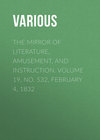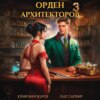Read the book: «The Mirror of Literature, Amusement, and Instruction. Volume 19, No. 532, February 4, 1832», page 6
The Pilgrim's Progress undoubtedly is not a perfect allegory. The types are often inconsistent with each other; and sometimes the allegorical disguise is altogether thrown off. The river, for example, is emblematic of death; and we are told that every human being must pass through the river. But Faithful does not pass through it. He is martyred, not in shadow, but in reality, at Vanity Fair. Hopeful talks to Christian about Esau's birthright, and about his own convictions of sin, as Bunyan might have talked with one of his own congregation. The damsels at the House Beautiful catechise Christiana's boys, as any good ladies might catechise any boys at a Sunday School. But we do not believe, that any man, whatever might be his genius, and whatever his good luck, could long continue a figurative history without falling into many inconsistencies.
The passages which it is most difficult to defend, are those in which he altogether drops the allegory, and puts into the mouth of his pilgrims religious ejaculations and disquisitions, better suited to his own pulpit at Bedford or Reading, than to the Enchanted Ground or the Interpreter's Garden. Yet even these passages, though we will not undertake to defend them against the objection of critics, we feel that we could ill spare. We feel that the story owes much of its charm to these occasional glimpses of solemn and affecting subjects, which will not be hidden, which force themselves through the veil, and appear before us in their native aspect. The effect is not unlike that which is said to have been produced on the ancient stage, when the eyes of the actor were seen flaming through his mask, and giving life and expression to what would else have been an inanimate and uninteresting disguise.
The style of Bunyan is delightful to every reader, and invaluable as a study to every person who wishes to obtain a wide command over the English language. The vocabulary is the vocabulary of the common people. There is not an expression, if we except a few technical terms of theology, which would puzzle the rudest peasant. We have observed several pages which do not contain a single word of more than two syllables. Yet no writer has said more exactly what he meant to say. For magnificence, for pathos, for vehement exhortation, for subtle disquisition, for every purpose of the poet, the orator, and the divine, this homely dialect—the dialect of plain working men—was perfectly sufficient. There is no book in our literature on which we would so readily stake the fame of the old unpolluted English language—no book which shows so well how rich that language is in its own proper wealth, and how little it has been improved by all that it has borrowed.
Cowper said, forty or fifty years ago, that he dared not name John Bunyan in his verse, for fear of moving a sneer. To our refined forefathers, we suppose, Lord Roscommon's Essay on Translated Verse, and the Duke of Buckinghamshire's Essay on Poetry, appeared to be compositions infinitely superior to the allegory of the preaching tinker. We live in better times; and we are not afraid to say, that, though there were many clever men in England during the latter half of the seventeenth century, there were only two great creative minds. One of those minds produced the Paradise Lost, the other the Pilgrim's Progress.—Edinburgh Review.
THE GATHERER
A London publisher advertises a collection of Nursery Tales as a "handsome present for youth." Here the schoolmaster is surely behind-hand.
IMPROMPTU.—TO A LADY
(From the Italian.)
Think not thy faults, my pretty scold,
Like transient clouds will pass away;
Thine image in the rose behold,
Whose leaves fade ere the thorns decay.
E.L.J.
This trifle was sent to the Mirror a few days since, and last Saturday it appeared in the Literary Gazette, with the same signature, E.L.J.—Is not this double-dealing?
Pantomimes.—Four hundred persons are nightly employed in the pantomime at Covent Garden Theatre, on the stage, behind the scenes, and in the orchestra. Of this number are 90 carpenters in the machinery, property, and scenic department. The usual cost of one of these relics of olden Christmas at a patent theatre is £2,000.; and upwards of £10,000. are annually expended in producing pantomimes for the amusement of the large and little children of this great metropolis.
How to keep away the Cholera.—Fear has proved at all times, but more particularly during the prevalence of cholera, a fruitful predisposing cause of disease; be firm, therefore, and confident. Cheerfulness of disposition, equanimity and serenity of mind, are essential means of preservation from epidemic disorders, cholera especially. You have now the consoling assurance of the New Board of Health, in confirmation of what we, the anti-contagionists, in regard to cholera, had long before declared and contended for, that the disease does not pass to those about the sick, and seldom spreads in families. Cholera, therefore, is thus disarmed of one of its worst terrors. You only run the average share of risk of one in 1,200,000 individual inhabitants of the metropolis, of being affected by the epidemic influence of the atmosphere, while that influence lasts; and as you are put in possession of several means to counteract that influence, the chances are greatly in your favour that you will not be attacked by cholera at all. To this conclusion I am authorized to come by my experience, which has been very considerable, and my observations, in more than one general epidemic, and by what I have read in all the authors (twenty or thirty of them) who have treated of cholera.—Dr. Granville.
The Cholera.—An interesting experiment was tried at Newcastle last week, on the state of the atmosphere. A kite was sent up, having attached to it a piece of fresh butcher's meat, a fresh haddock, and a small loaf of bread. The kite ascended to a considerable height, and remained at that elevation for an hour and a quarter. When brought to the ground, it was found that the fish and the piece of meat were both in a putrid state, particularly the fish; and the loaf, when examined through, a microscope, was discovered to be pervaded with legions of animalculae. It may be worth while to repeat the experiment in other places to which cholera may unfortunately extend itself.—Evening Paper.
Foreign Books.—From official accounts it appears that the foreign books imported into the United Kingdom in the year 1830, weighed 3,441 cwt. 3 qrs. 13 lbs. the amount of duty upon which was £11,865 4s. 4d. We find this in a paper on the Duties on Foreign Books in the Foreign Quarterly Review, just published; in which the imported old books have obtained a considerable ascendancy over the new ones.
The lovers of the Fine Arts will hear with sorrow, the destruction by fire of Mr. Wilmshurst's splendid Painted Window of the Tournament of the Field of the Cloth of Gold, described at page 246, vol. xv. of The Mirror. It was completed about two years since at a cost of nearly 2,000l., and three years' labour of the artist.
FAMILIAR SCIENCE
This Day was published, with many Engravings, price 5s.,
ARCANA OF SCIENCE,
AND
ANNUAL REGISTER of the USEFUL ARTS,
for 1832:
Abridged from the Transactions of Public Societies, and Scientific Journals, British and Foreign, for the past year.
*** This volume will contain all the Important Facts in the year 1831—in the
MECHANIC ARTS,
CHEMICAL SCIENCE,
ZOOLOGY,
BOTANY,
MINERALOGY,
GEOLOGY,
METEOROLOGY,
RURAL ECONOMY,
GARDENING.
DOMESTIC ECONOMY,
USEFUL AND ELEGANT ARTS,
GEOGRAPHICAL DISCOVERIES,
MISCELLANEOUS SCIENTIFIC INFORMATION.
Printing for John Limbird, 143, Strand; of whom may be had volumes (upon the same plan) for 1828, price 4s. 6d., 1829—30—31, price 5s. each.










